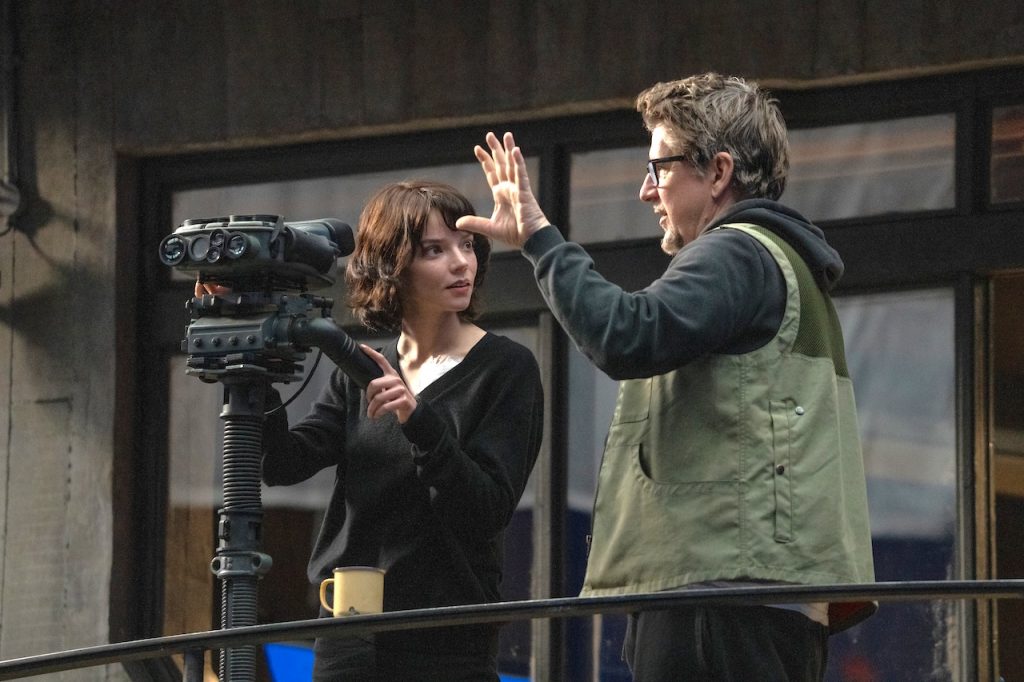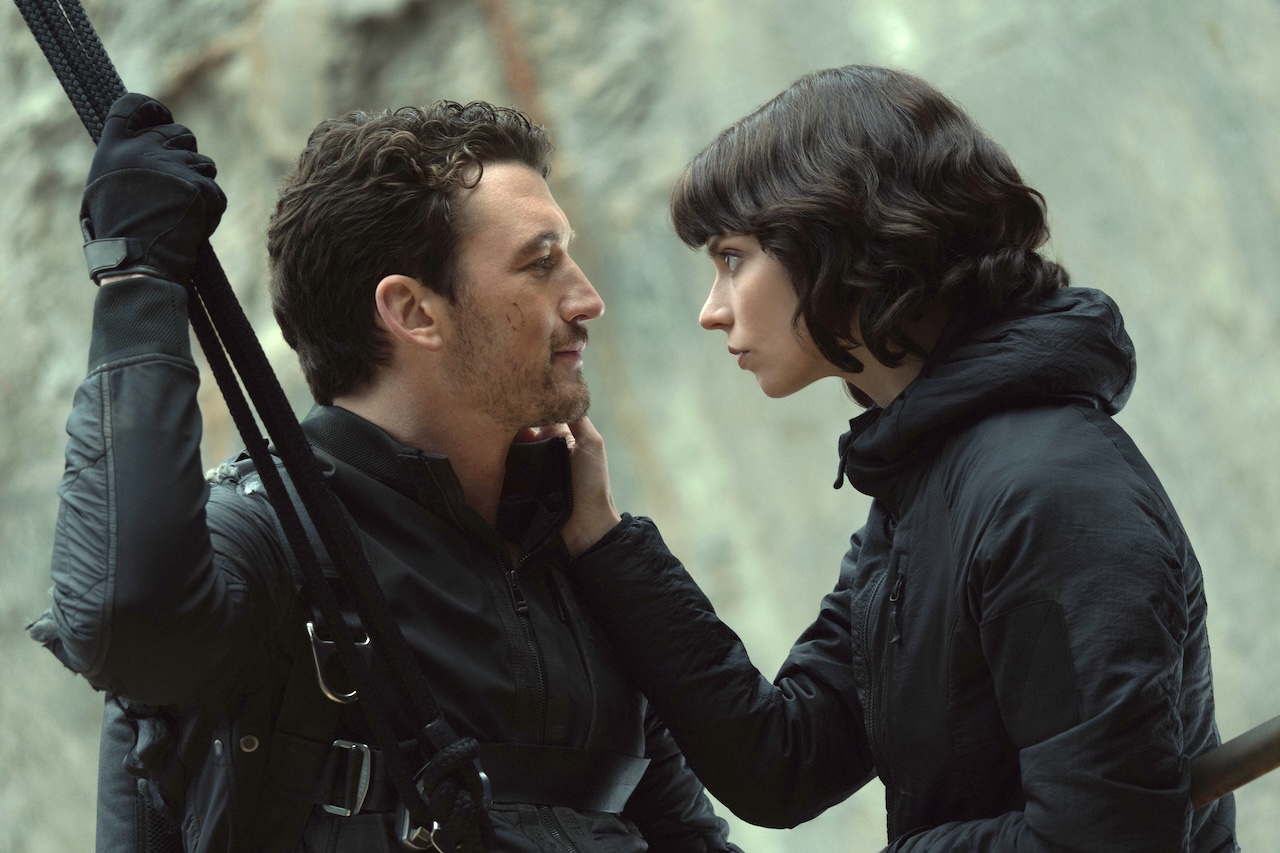This article contains minor spoilers.
“The first thing that leapt out at me about The Gorge was the thing that made me not want to do it at first. Then it was the very same thing that made me want to do it,” quips director Scott Derrickson (The Black Phone, Sinister). That thing was the daring, surprising, unique and ambitious interplay of the different genres of the movie which he describes as being a “romantic science fiction or political thriller.”
Another reason to make the film is that The Gorge is an original screenplay from screenwriter and co-producer Zach Dean (Fast X, The Tomorrow War). “It’s not IP. This is the very kind of big budget event movie that I wish Hollywood would make more of. We went for the big swings.” The film stars the stellar Miles Teller, Anya Taylor-Joy, and Sigourney Weaver.
Adding The Scott Derrickson Touch
Derrickson and his writing/ producing partner C. Robert Cargill were generally satisfied with Dean’s script, but wanted to elevate the romance between Levi (Teller) and Drasa (Taylor-Joy). These scenes represent about a third of the script which they felt were understated and “sublime in places.”
Scott was happy with the overall setup and mystery of The Gorge, but he wanted to add more layers to the mythology of it. He felt it read too much like a “straight zombie movie” in early drafts. “There wasn’t enough originality to the visuals. We had to deliver things we haven’t seen before. We had to deliver some real surprises,” he iterates.
He then added the secret government military experiments taking place. “We felt it would be interesting if we played with this human hybrid DNA idea and drew more on folk horror regarding the source of the monsters,” he continues.
“There are stories about plant people, stick men, sentient trees, and the dangers of the mutated monstrous natural elements, and the forest in particular.” Derrickson cites David Bruckner’s 2017 film The Ritual and John Wyndham’s The Day Of The Triffids as influences which shaped The Gorge.
A Romantic Wild Ride Date Movie
Derrickson is cognizant of the genre cocktail that is The Gorge, so he was careful to modulate the tone of the movie accordingly.
“I knew that it was not going to be was a romantic movie that then turns into a zombie movie. I also needed it to not be two movies with the romantic movie in the first half and then the genre-blending action movie in the second half. The way I dealt with that was by not letting the romance die in the second half and allowing a few romantic beats between Levi and Drasa, especially when they enter The Gorge,” notes Derrickson.
“There was a real emphasis on how they watch each other, how they look out for each other, how they work as a team, how they even touch each other as they’re moving, and how they put themselves in harm’s way for the other person. There’s something very romantic about their connectivity inside The Gorge,” he concludes.
I wanted it to be a romantic story of two lonely people you could really root for

Drasa (Anya Taylor-Joy) & Scott Derrickson. Photo courtesy of Apple TV
The Gorge – A Place Of Dire Secrets
“The idea of The Gorge above, the layer of fog that blocks our image, and then falling through that fog, goes back to classic storytelling. That’s the underworld that we see all the way back into classic, even ancient literature,” states Derrickson.
“We’ve got a character Levi, who is haunted, even trapped, in an unknown quiet despair because of the secrets that he has held at the hand of corporations and governments.”
“Levi, through love and the shock and traumatic experience of The Gorge itself, is dislodged from himself through the love of this woman. The intensity of the experience makes him recognize that the secrets that have kept him in this stunted state of spiritual frozenness and despair.”
“He breaks free of it and subsequently wants to release and bring out into the open the evil secret of The Gorge itself and the suffering that it’s creating.”
The Gorge holds an angry truth that wants to be known
Even Drasa is tormented by her secrets. Scott points out a pivotal line of dialogue that she says during a conversation with her father when he says, “Give me your shame.” It’s an opportunity for him to discuss the pain that he feels inside. Later, Drasa confesses to Levi that she always had her father to tell her secrets to. Now she reveals them to Levi.
“There’s a spiritual strength that she has that he doesn’t. Levi’s breaking down because he has carried too many secrets for too long. The idea that she becomes his confessor and that she is somebody that he finds he can trust and disclose these things to, allows him to find liberation and freedom.”
Themes
The Gorge touches on a range of themes besides the secrets the government and military hold. Scott Derrickson is nonchalant about the overt exploration of theme in his movie despite their presence.
“I think a central theme, or even sub-themes, are things that emerge and exist in the story. The good ones exist almost inexpressibly as they live as an outflow of the drama and the character story. The idea of focusing a theme and shaping a story towards it is something I don’t do.”
Scott references author Mary Flannery O’Connor’s attitude to theme, “If you can easily state the theme of a story, you can be sure that it’s not a very good one.” Scott argues that writers should simply trust a good story and the themes will naturally emerge.
On a deeper level, Scott believes that The Gorge “will make us deal with the parts of ourselves that we’re keeping secret, even from ourselves.”
Self Reflection
We asked Scott Derrickson how he categorizes himself as a filmmaker.
“I want to tell grounded, realistic character stories about important, significant human emotions; things we suffer… real relationship dynamics, real characters with pain, real problems, real transformations, or in the case of somebody like Ellison Oswalt from Sinister, real lack of transformation, even under duress.”
He combines this practical approach to storytelling with the idea that the world is a magical, mysterious and exciting place.
“The world is not limited by the dogmas of religion or by the materialism of science. The reason I make genre films is because I think that the world is above all mystical. I’m a mystic first. There’s much more to it than we realize or we know.”
